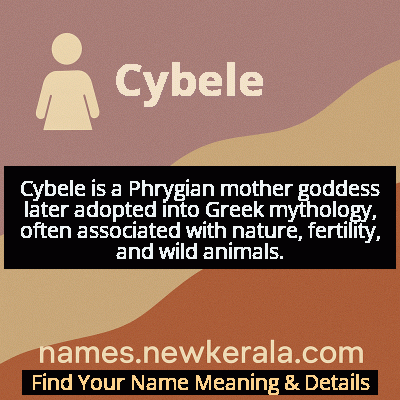Cybele Name Meaning & Details
Origin, Popularity, Numerology Analysis & Name Meaning of Cybele
Discover the origin, meaning, and cultural significance of the name CYBELE. Delve into its historical roots and explore the lasting impact it has had on communities and traditions.
Name
Cybele
Gender
Female
Origin
Greek
Lucky Number
7
Meaning of the Name - Cybele
Cybele is a Phrygian mother goddess later adopted into Greek mythology, often associated with nature, fertility, and wild animals.
Cybele - Complete Numerology Analysis
Your Numerology Number
Based on Pythagorean Numerology System
Ruling Planet
Neptune (Ketu)
Positive Nature
Intuitive, analytical, spiritual, and inquisitive.
Negative Traits
Secretive, reserved, aloof, and can be overly critical.
Lucky Colours
Green, yellow.
Lucky Days
Monday.
Lucky Stones
Cat’s eye, moonstone.
Harmony Numbers
1, 5, 6.
Best Suited Professions
Scientists, researchers, spiritual leaders, detectives.
What People Like About You
Depth of knowledge, analytical skills, spirituality.
Famous People Named Cybele
Cybele (Mythological)
Ancient Goddess
Worshipped as the Great Mother of Gods and all life in Anatolian and Greek mythology
Cybele (Historical Figure)
Roman Cult Leader
Influenced the spread of Cybele worship from Anatolia to Rome, establishing the Megalesia festival
Cybele (Literary Reference)
Mythological Figure
Featured prominently in Ovid's Metamorphoses and Virgil's Aeneid as a powerful maternal deity
Name Variations & International Equivalents
Click on blue names to explore their detailed meanings. Gray names with will be available soon.
Cultural & Historical Significance
In 204 BCE, during the Second Punic War, the Romans officially adopted her worship, bringing her sacred black stone from Pessinus to Rome, where she became known as Magna Mater (Great Mother). Her Roman festival, the Megalesia, featured theatrical performances, games, and ritual banquets. Cybele's worship represented the enduring power of feminine divinity and nature's cycles, influencing art, literature, and religious practices across the ancient Mediterranean world for over two millennia. Her temples became centers of community life, and her mythology intertwined with local traditions wherever her worship spread, creating a rich tapestry of cultural exchange and religious syncretism.
Extended Personality Analysis
Individuals named Cybele are often perceived as possessing strong maternal instincts, natural leadership qualities, and deep emotional intensity. They tend to be protective, nurturing figures who create safe spaces for others while maintaining formidable personal strength. Like the goddess who ruled over wild nature, Cybeles often exhibit a passionate, untamed spirit combined with profound wisdom and intuition. They are typically creative, artistic individuals with a strong connection to nature and cycles of life.
Their personality blends fierce independence with deep compassion, making them both inspiring and comforting presences. Modern Cybeles often demonstrate resilience in facing challenges, drawing strength from their connection to ancient feminine power. They tend to be authentic, grounded individuals who value deep relationships and meaningful connections over superficial interactions. Their combination of nurturing warmth and inner strength makes them natural healers and leaders in their communities, often drawn to professions involving caregiving, education, or environmental protection where they can express their innate protective and creative qualities.
Modern Usage & Popularity
In contemporary times, Cybele remains a rare but meaningful choice for parents seeking names with mythological depth and feminine power. The name has seen a slight resurgence in recent years, particularly among parents interested in ancient history, mythology, or nature-inspired names. While it doesn't rank in the top 1000 names in most English-speaking countries, its usage has increased in academic and artistic circles. Modern bearers often appreciate the name's connection to earth-centered spirituality and feminine empowerment. The name is particularly popular in France and Spanish-speaking countries where variations like Cybèle and Cibeles are more commonly used. Its rarity makes it distinctive without being completely unfamiliar, appealing to parents seeking unique names with historical significance and strong character. Recent trends show increased usage among parents looking for names that celebrate feminine strength and environmental consciousness.
Symbolic & Spiritual Meanings
Cybele symbolizes the primordial power of nature, maternal protection, and the cycle of life, death, and rebirth. As the Great Mother, she represents the earth itself—fertile, nurturing, yet wild and untamable. Her symbolism extends to mountains and caves as sacred spaces, lions as her animal companions representing untamed power, and the pine tree symbolizing eternal life. The tympanum (drum) and cymbals associated with her worship represent the rhythmic cycles of nature and ecstatic spiritual connection. Cybele embodies the paradox of fierce protection and gentle nurturing, teaching that true strength includes compassion. Her mythology with Attis symbolizes the annual cycle of vegetation—death in winter and rebirth in spring. Modern interpretations see her as an archetype of feminine power, environmental consciousness, and the sacred interconnection of all life, making her symbolism particularly relevant in contemporary ecological and feminist contexts where she represents both the vulnerability and resilience of the natural world.

